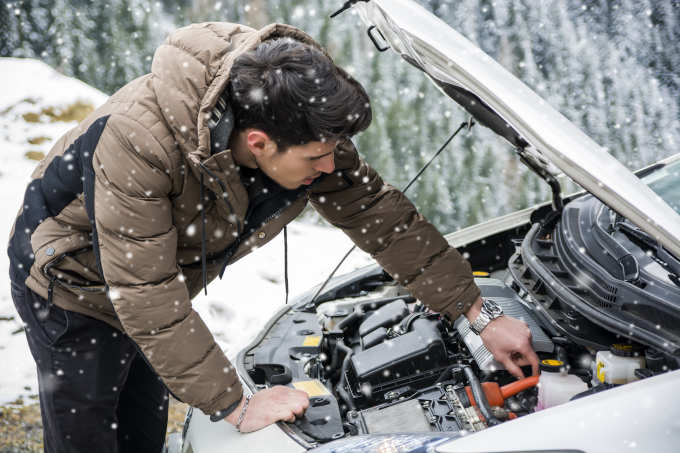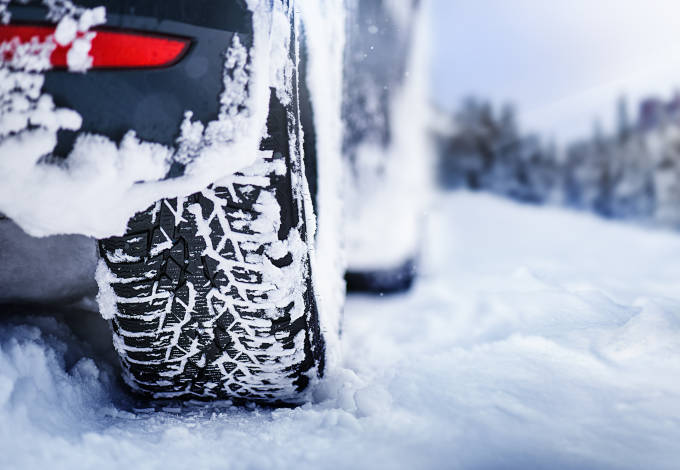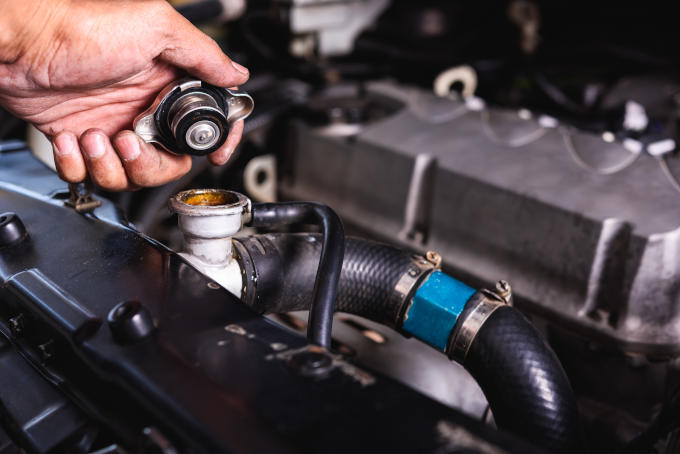Weather and temperature extremes in winter can play havoc with the condition of your vehicle.
In today’s blog, our questions center on how winter affects critical systems in your vehicle, how to prepare the vehicle for these impacts, and positive driving behaviors that can help prevent damage from winter weather.
How Does Winter Impact Your Vehicle’s Key Systems and Components?
Let’s take a closer look at the impacts of Jack Frost on your vehicle’s essential components and systems.
Transmission
Winter can be messy, and your transmission needs to be in top shape to circumvent the impact of cold weather. Loose seals or any other type of leak—whether from age, damage, defect, or inattentive service—can be catastrophic for your vehicle. Why? Loose seals and leaks in a transmission do two things: they allow transmission fluid to get out and the possibility of water to get in. Wet weather conditions or driving through large puddles with a compromised transmission can allow water to find its way in and cause serious transmission damage or failure.
Likewise, low transmission fluid caused by leaks can quickly lead to an overheated transmission, resulting in severe damage or catastrophic failure with high repair bills.
Knowing the warning signs of transmission problems—regardless of the cause—can keep you safe and mobile during the winter months.
Avoiding Transmission Issues
A complete transmission service to check for defects or leaks and ensure everything is properly sealed and functioning correctly is an excellent place to start to help avoid winter issues.
Engine
Cold weather makes your engine run less efficiently. You may hear people say that your vehicle “runs rich” in the winter, which means it pumps through more gasoline, creating a high gas-to-air ratio. Short daily trips in the cold mean that your vehicle doesn't have the proper opportunity to warm up and fails to burn off water vapor. In the end, your exhaust system may rust prematurely, causing various problems down the line.
Avoiding Engine Issues
Parking your vehicle in a warmer place overnight is a good start to ensure your engine warms up more quickly. If that’s not possible, then try to plan in a way that means you combine journeys into longer ones and make fewer short trips. This is a good habit to practice at any time of the year!
Remember that the engine warms up faster when driven, so avoiding idling for long periods while in Park “P” is a good idea.
Tires
The air in your tire also contracts when winter comes, which makes it easier for tires to be underinflated, even if you’d recently pumped them up to their correct PSI. For every 10 degrees that the temperature drops, you lose about 1-2 PSI in your tires, so keep a close eye on temperature changes. Contrary to popular belief, lower tire pressure in winter does not boost traction.
Avoiding Tire Issues
Check your tire pressure with a pressure gauge when temperatures fall significantly and top them up to the OEM-recommended PSI level. Failing to do so can mean your tires are more susceptible to blowouts, as well as losing traction. If your roads are snowy or icy, then consider switching to winter tires, too.
Brakes
One thing that your brakes don’t like on the winter roads is the salt used to clear the icy and snowy roads. In fact, your tires, alloy wheels, undercarriage, and lower parts of your side panels also hate the corrosive nature of road salt. In addition, your brakes are working very hard in the winter, which means excess heat, friction, and thus wear and tear.
Avoiding Brake Issues
Keeping your vehicle’s undercarriage, wheels, and tires rinsed off after driving through road salt is a surefire way to ensure there’s no salt buildup. If it’s washed off quickly, it can’t embed itself into the nooks and crannies of your vehicle.
Radiator
The mixture of coolant-antifreeze needs to be correctly balanced in your radiator. A mix of equal parts coolant and antifreeze is appropriate for most cold locations. Many pre-mixed products you can purchase in auto stores have this ratio. You can also buy the concentrated coolant and simply mix it with distilled water. An improper ratio can cause the coolant in your engine to freeze and create blockages, cracks, and leaks.
Avoiding Radiator Issues
Besides getting the correct ratio of coolant to antifreeze, it’s also critical that during any pre-winter service, a mechanic checks over your radiator for signs of metal contraction, as well as damaged hoses or clamps. If these are not adequately taken care of, they can cause overheating, leading to catastrophic engine failure.
What Happens When I Take No Action For My Car This Winter?
The previous section highlighted that failing to take proper care of your vehicle in the winter can lead to some pretty serious (and expensive) repairs. There’s more to it than that, however. A vehicle that is not properly taken care of during the winter months is a vehicle that is not safe to be on the road.
An uncared-for vehicle can present a real danger to you, your passengers, and other drivers, brave winter cyclists, pedestrians, and others.
Accidents
Failure of critical components like your brakes, tires, engine, or transmission due to lack of maintenance and care could result in a serious accident. Your vehicle is a finely tuned mechanical instrument, and weather extremes upset the harmony. Once balance is lost, the risk of accidents is much greater.
Stranded in the Snow
Another possibility is that you become stuck or stranded in snow or subfreezing conditions in a remote area. Without heat or assistance for a long time, this could create an emergency citation quickly.
Avoid the Worst With AAMCO Lee’s Summit
Remaining vigilant to the warning signs of vehicle trouble and keeping up-to-date with your vehicle’s maintenance schedule will ensure you stay much safer on winter roads. Book an appointment at AAMCO Lee’s Summit today to ensure your vehicle circumvents winter’s effects at every turn!










